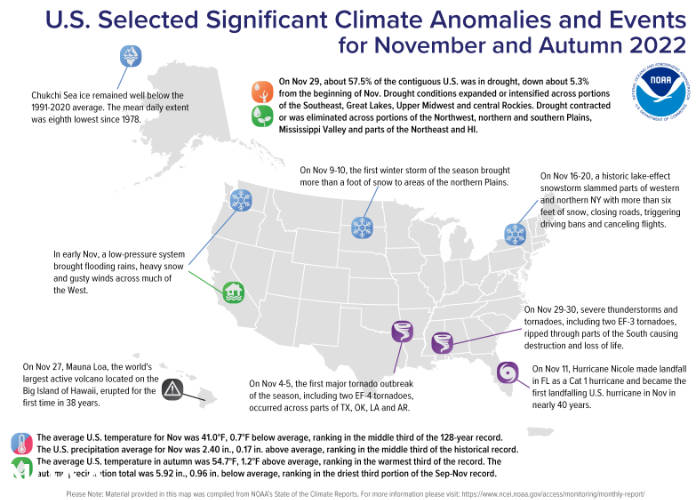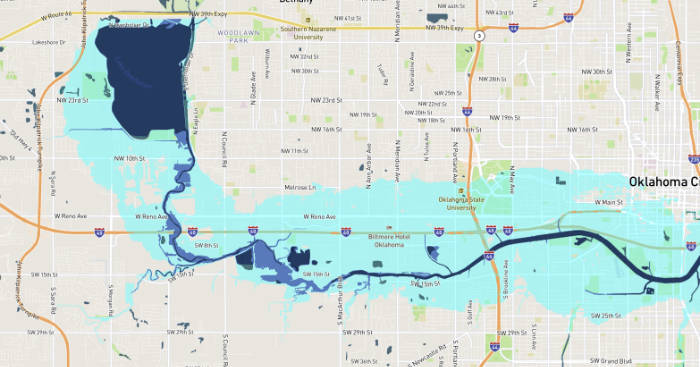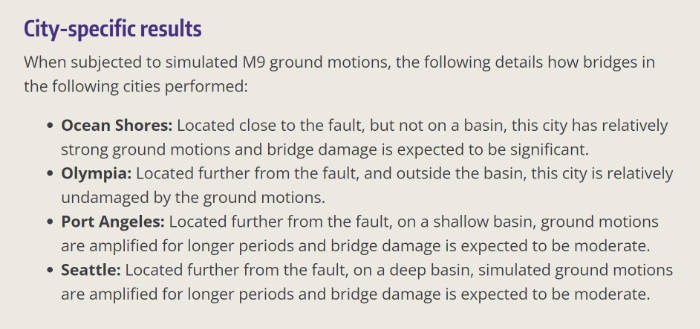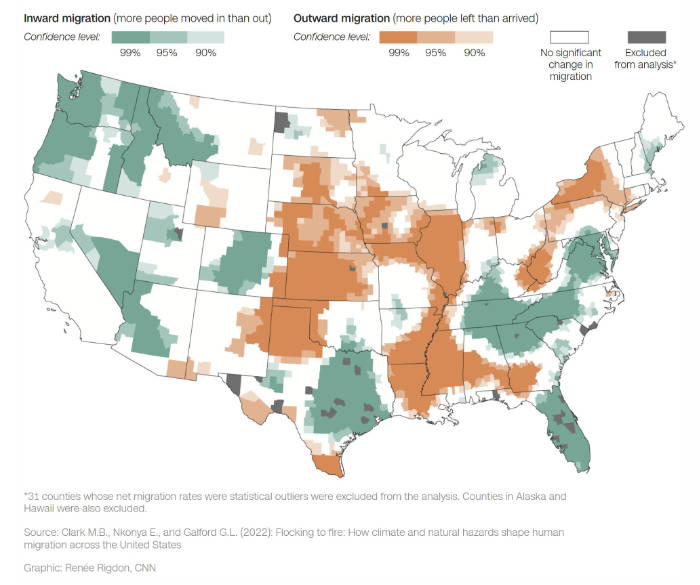This will be the last News Roundup. Thank you all for the love and contributions, it has always mattered to me 🙂
Do you like this replacement idea? To still scratch this itch for you and keep current events centralized in one place, we plan on creating a blank News Roundup forum thread at the beginning of every week where you/anyone can share news as a top-level comment and then talk about it in the replies. So, in a way, we got the ball rolling and are now putting it in your hands.
Why this is changing: Creating these posts takes >20 hours per week, which I can’t keep doing as a volunteer, and frankly the 24/7 doomscrolling and weeding through the bowels of the internet starts to weigh on you. So it’s just not something we can commit to anymore.
In short:
- New gun attacks on Duke Energy facility in South Carolina — no disruptions.
- US gas and diesel prices keep falling.
- More Americans are moving to places with high climate hazards.
Duke Energy completed repairs to the power equipment damaged by shootings; One person died during the outage; Fresh attacks on Duke Energy in SC, as well as previous attacks in OR, WA, and FL uncovered
Duke Energy says it has completed repairs to NC power equipment damaged by shootings. According to PowerOutage.us, there were just over 500 customers still without power as of the writing of this roundup.
Moore County had declared a state of emergency, and people relocated temporarily to ensure they could keep warm and safe. People are recounting how coming together as a community helped deal with the disruption, and how it impacted people in many ways — monetarily and emotionally — “but you just keep living life.” One Moore County resident died during the power outage and investigators are working to determine whether the death was related to the power outage or if it was just a normal medical condition that caused the death.
The electrical grid has been physically attacked at least six times in Oregon and Western Washington since mid-November. As well as six ‘intrusions’ on Duke Energy facilities in Florida back in September. Three weeks before the Moore County attack, another substation was deliberately disabled near the Eastern North Carolina town of Maysville (Paywall).
Shots were fired near a Duke Energy facility in South Carolina on Wednesday. No one was hurt.
Here are four takeaways on the Moore County substation attack for Charlotte, big banks, and security, from the executive director of UNC Charlotte’s Energy Production and Infrastructure Center.
The North Carolina attacks underscore power grid vulnerabilities and how “Destroying this infrastructure can have a crippling effect.”
There’s a conversation about it in the forum, for those interested in chatting more about it.
- Here’s what to do if your home loses heat in the middle of winter.
- Fridge/freezers should keep cold for a few days even in the event of a power outage. Alternatively, transfer food that can spoil into a cooler full of ice (shoutout to community member M.E. who first gave us this tip!). Food and drinks will also keep cool if hidden in snow or just outside if temps are cold enough — just make sure that animals don’t get to it.
- Alternatively, assess what electronics or appliances you cannot afford to lose power to. As an example, if needing to power a fridge or run lights, you might need something like a generator. For powering a CPAP machine, a laptop, or recharging headlamps, a portable power station like a Jackery should do it. If needing to recharge a phone, a portable power bank is enough. While it is true that during a power outage cell towers might be down, you might be able to study or work offline, or maybe keep entertained by offline games or downloaded music and movies.
The UK is ‘sleepwalking’ into a food crisis; US gas and diesel prices keep falling; America’s top CEOs are preparing for an economic slowdown
CEOs from JPMorgan, General Motors, Walmart, United, and Union Pacific are preparing for an economic slowdown. Among the issues cited are rising interest rates, inflation, and geopolitical concerns.
US gas prices fell below last year’s average and could drop below $3 around the holidays. Diesel prices are also falling (for now):
BREAKING: The average price of diesel has fallen back below $5 to $4.99 per gallon, according to GasBuddy. The price could fall another $0.50-$1.00 per gallon in the weeks ahead.
— Patrick De Haan ⛽️📊 (@GasBuddyGuy) December 8, 2022
According to a study, the cost of home insurance in Texas has increased by 6% in the past year to an average of $3,600, making the state the second-most expensive in the country. Recent natural disasters, rising home prices, and inflation all contribute to this trend.
The National Farmers Union (NFU) has warned that the UK is ‘sleepwalking’ into a food crisis. The NFU is urging the government to step in to help farmers. Yields of energy-intensive crops like tomatoes, cucumbers, and pears were likely to hit their lowest level this year since records began in 1985. Soaring fuel, fertilizer, and feed costs are to blame
Latest data shows that OECD inflation rose to 10.7% in October 2022, as most countries’ food prices continued to accelerate. Food inflation in the US was 12.4%:
🆕📈 #Food #inflation continued to rise in the OECD in October, to 16.1%, from 15.3% in September, reaching its highest rate since May 1974, with rises in 33 of 38 #OECD countries.
🔎👉 https://t.co/KsvfJhXstv pic.twitter.com/C0o8WP94xU
— OECD ➡️ Better Policies for Better Lives (@OECD) December 7, 2022
- One of the basic ways to prepare for inflation, recessions, or layoffs is to set some money aside for emergencies and to build a survival pantry while implementing the first-in-first-out (FIFO) method. If facing economic difficulties, it might be worth checking out what kind of benefits or tax credits one is entitled to (could be anything from receiving SNAP vouchers to credits to help pay heating bills, etc.).
CDC encouraging masking; Cold temperatures make us more vulnerable to infection; Pfizer granted priority reviews of their RSV vaccine, and is seeking authorization for their Covid bivalent vaccine for kids under 5
The CDC is now encouraging masking to prevent the spread of Covid, flu, and RSV over the holidays.
A new study shows that cold temperatures could make our respiratory systems more vulnerable to infection. A specific immune response inside the nose that fights off infection-causing upper respiratory viruses, is inhibited by colder temperatures. This then makes infections more likely to occur as temperatures drop. Part of what makes wearing a mask so effective is that it protects and covers the nose.
There’s a shortage of cold and flu meds for kids: Here’s what parents can do.
Child deaths from Strep A bacterial infection in the UK rose to 15.
The FDA granted priority review to Pfizer’s RSV vaccine, and the company is also seeking authorization to offer their bivalent Covid vaccine to kids under 5 — but not as a booster; instead, it would be part of an updated primary series.
More Americans are moving to places with high climate hazards; A new study predicts less damage than previously expected to bridges in Western Washington following a big earthquake; Marshall Fire survivors experience news symptoms caused by smoke in houses left standing
NOAA’s significant climate anomalies and events for November and Autumn 2022’s key points:
- Abnormally dry conditions covered nearly 80% of the Lower 48 but conditions improved since.
- It was the coldest November across parts of the Pacific Northwest in nearly four decades.
- Parts of New York were hit with record snowfall.
- Hurricane Nicole wrapped up a destructive hurricane season.

Here’s the status of one of the neighborhoods hit by Hurricane Nicole one month after, and current pictures of Volusia Beach.
A new study found that Americans are moving to places with high climate hazards while climate disasters increase. People are moving to the wildfire-prone and drought-stricken West, as well as to hurricane-prone Florida, which is notoriously appealing to a lot of retirees. People are also migrating to major cities like Nashville, Charlotte, DC, Atlanta, and suburbs in the Northwest. But people aren’t factoring climate risks into their decision to move, the study showed.
While there is nothing wrong with moving into places that are at risk of climate disasters, it seems important to understand the risks, know what to expect, and prep accordingly. Here are some guides, posts, and articles on how to prepare for a variety of scenarios:
- How to prepare for and survive a wildfire.
- How to survive severe heat.
- Flood preps & emergency raft recommendations.
- How to prepare for and survive hurricanes.
- Drought and how to prepare for food production.
- Here’s how to prepare for other scenarios.
- Be prepared to pay more for home insurance, if can get coverage at all (there have been many examples of this in the past months/years, from the news about Texas in today’s roundup to the deterioration of Florida’s insurance marketplace, to reinsurance premiums getting higher in places experiencing more disasters, etc.) Might be worth shopping around and understanding what insurance companies will cover.
- Recent studies have predicted that we will experience more extreme events within the next 8 years. So, even if a place has currently a low or moderate risk of a climate disaster, it will likely be getting worse in the coming years. Plan accordingly!
- Fortunately, the 80/20 of prepping will get most people covered for a majority of disasters, including the intentional attacks on facilities that have been in the news recently. Once the 80/20 is covered, people usually graduate to prep for specific scenarios (linked above).
Here’s an interactive article with good visualizations about what would happen if the Overholser Dam in Oklahoma City failed.

A new study predicts less damage than previously expected to bridges in Western Washington following an M9 earthquake. While there are more than 500 bridges alone along major routes extending from Olympia to Everett, the researchers focused their efforts on 10 specific locations in Western Washington. Among the 10 locations, the results varied significantly. The estimated damage to bridges depended on the distance from the fault and whether the location was underlain by a sedimentary basin.

When you hear the advice ‘Turn around; don’t drown’ this is why (no judgment on the driver — the subreddit’s name is just where the video was posted):
- Never drive or walk through flood waters. People overestimate the ability to cross flood waters. Just six inches of moving water can knock you down, and one foot of moving water can sweep your vehicle away.
The Marshall Fire destroyed more than 1,000 homes but also left hundreds standing and damaged. Students at Colorado University interviewed Marshall Fire survivors over four months to gain insight into the effects of smoke damage. Some homes near the burn area appear to be fine from the outside. But toxic compounds and residues from urban materials incinerated in the fire penetrated these houses’ walls and furniture. When inside their homes, homeowners experienced new health symptoms. Here are the findings.
The rest
Covid, Russia’s war on Ukraine, and China’s 20th Communist Party Congress have raised crisis awareness among Taiwan’s population, with more residents willing to prepare for a potential conflict. The article looks at how the Doomsday Preppers Association in Taiwan is rationally teaching civilians survival techniques (despite the name).
Germany rehearsed for emergencies and tested its first nationwide cell broadcasting for the first time. During the floods in 2021, many people were not warned of the life-threatening flood in good time showing that civil protection is important. After this test, the authorities will evaluate, among other things, how many people the cell broadcast reached.
Here are tips from the Better Business Bureau on how to avoid holiday scams. And here are our tips on how to shop for preps online without getting scammed.
For the doomers 😉 Here is a website that allows you to simulate the impact of an asteroid in your city.
The early-stage startup Aeroknite is making fire-extinguishing drones that can be used to fight wildfires. One of the founders jokingly noted that he didn’t want to sound like a “doomsday prepper”, but drones may be the answer to pressing issues like the increase in wildfires as global temperatures rise.
Click the link below to learn about the common warning signs and risk factors for emotional distress in children, teens, and adults disaster survivors, first responders, and recovery workers. Common signs are:
- Eating or sleeping too much or too little
- Pulling away from people and things
- Having low or no energy
- Having unexplained aches and pains, such as constant stomachaches or headaches
- Feeling helpless or hopeless
- Excessive smoking, drinking or using drugs, including prescription medications
- Worrying a lot of the time; feeling guilty but not sure why
- Thinking of hurting or killing yourself or someone else
- Having difficulty readjusting to home or work life
The #holidayseason can be especially hard for those coping after a #disaster. Learn about the warning signs of emotional distress and if you're struggling, don't hesitate to call or text us at 1-800-985-5990. We're here for you, 24/7. https://t.co/YyGuDL7C4W
— Disaster Distress Helpline (@distressline) December 7, 2022
In the US you can also contact the 988 Suicide & Crisis Lifeline / Línea de Prevención del Suicidio y Crisis 1-888-628-9454.


You are reporting the comment """ by on